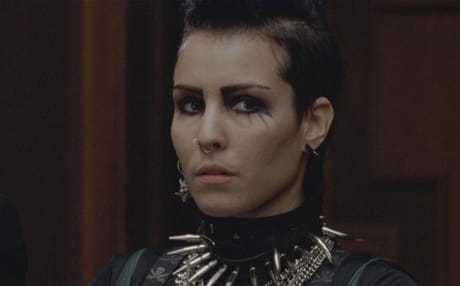Starting immediately where The Girl Who Played with Fire left off, this third and final instalment of Stieg Larsson's Millennium trilogy deals with the aftermath of irreverent hacker Lizbeth Salander's (Noomi Rapace) confrontation with her father, Alexander Zalachenko (Georgi Staykov), and her thuggish brother, Ronald Niedermann (Micke Spreitz). Suffering bullet wounds in the head, hip and shoulder, she spends the first half of the film in the hospital recovering while awaiting trial, which leaves most of the action in the hands of idealistic journalist Mikael Blomkvist (Michael Nyqvist).
As he attempts to publish an issue of Millennium revealing the government and criminal conspiracy behind Lizbeth's struggles, he is threatened, monitored, defamed and eventually attacked, as is ex-editor Erika Berger (Lena Endre). Meanwhile, Lizbeth gears up for her trial, where she must confront the psychiatrist that routinely abused her, Dr. Teleborian (Anders Ahlbom).
The Girl Who Kicked the Hornet's Nest tells its story with the same continuous television aesthetic and lacklustre style of its predecessor, which was also directed by Daniel Alfredson. Resultantly, it's similarly clunky and distancing, but benefits from a more complex and rewarding core story than Fire, making for satisfying, if implicitly disappointing, viewing.
Where The Girl with the Dragon Tattoo introduced subjugated characters fighting for a voice in an implicitly misogynist status quo and Fire explored the criminal framework that keeps that in place, Hornet tackles the broader ideology and dominant powers that set the bar for this quotidian reality. Because so much time has been spent building up a bigger picture while repeatedly knocking the underdog heroine down, this head-on confrontation and exposure of truth is deeply satisfying.
It's just unfortunate that Alfredson makes no effort to do more than the text suggests, merely directing each scene without thematic trajectory or subtlety. Sure, this is enough for a dominant mainstream audience familiar with the pulp novels, but the rich political implications and gender observations within these stories deserve more.
(Alliance)As he attempts to publish an issue of Millennium revealing the government and criminal conspiracy behind Lizbeth's struggles, he is threatened, monitored, defamed and eventually attacked, as is ex-editor Erika Berger (Lena Endre). Meanwhile, Lizbeth gears up for her trial, where she must confront the psychiatrist that routinely abused her, Dr. Teleborian (Anders Ahlbom).
The Girl Who Kicked the Hornet's Nest tells its story with the same continuous television aesthetic and lacklustre style of its predecessor, which was also directed by Daniel Alfredson. Resultantly, it's similarly clunky and distancing, but benefits from a more complex and rewarding core story than Fire, making for satisfying, if implicitly disappointing, viewing.
Where The Girl with the Dragon Tattoo introduced subjugated characters fighting for a voice in an implicitly misogynist status quo and Fire explored the criminal framework that keeps that in place, Hornet tackles the broader ideology and dominant powers that set the bar for this quotidian reality. Because so much time has been spent building up a bigger picture while repeatedly knocking the underdog heroine down, this head-on confrontation and exposure of truth is deeply satisfying.
It's just unfortunate that Alfredson makes no effort to do more than the text suggests, merely directing each scene without thematic trajectory or subtlety. Sure, this is enough for a dominant mainstream audience familiar with the pulp novels, but the rich political implications and gender observations within these stories deserve more.




